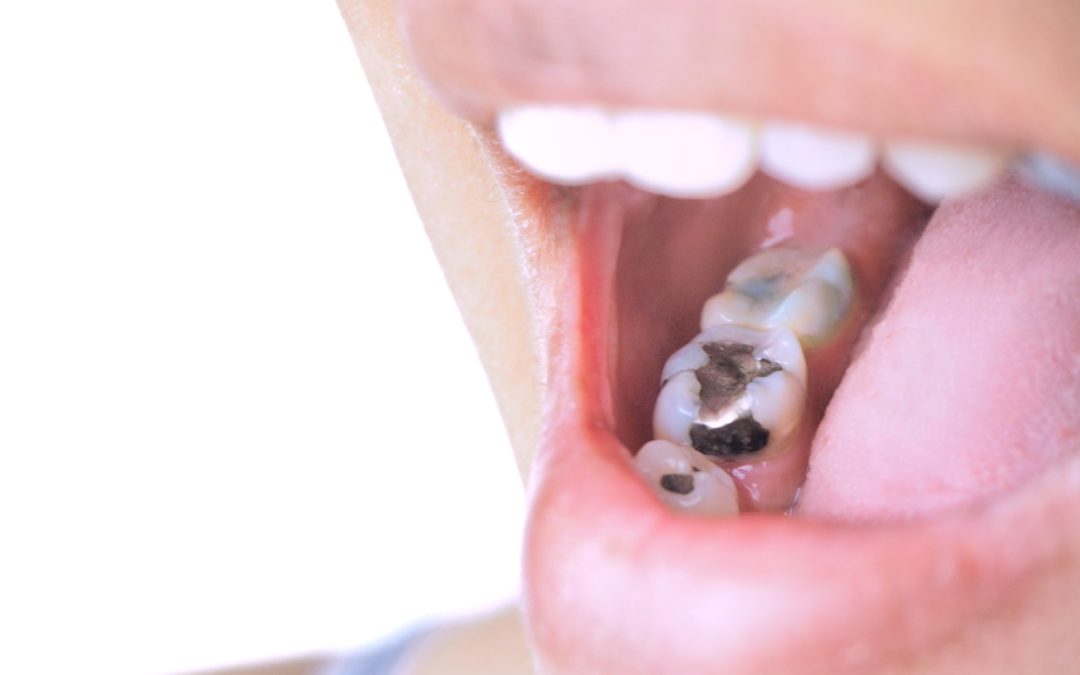Did you know that approximately 2 billion adults worldwide suffer from dental caries, with 520 million children suffering from the same?
Although enamel is the hardest substance on the human body, it’s still no match to the debilitating effects of bacterial acid. It’s the same acid that forms those holes in our teeth known as cavities.
Cavities are a very common dental problem, causing a lot of pain and discomfort to billions worldwide. Of course, proper dental hygiene will keep nasty cavities at bay, but one can’t help but wonder, what causes cavities? We’re glad you asked, and we have all the answers you need right here.
In today’s post, we’ll be taking a deep dive into what causes cavities and what you can do to prevent cavities.
What Is a Cavity?
A cavity is a hole that forms in your teeth as a result of tooth decay. Cavities appear as dark holes on the teeth that can be brown to completely black. They may be excruciating and can make the affected tooth highly sensitive to hot or cold temperatures.
If cavities are not treated, they will get larger and eventually reach the inner layer of your tooth, called dentin. The decay then spreads to the pulp — the center of the tooth containing blood vessels and nerves.
At this point, you will likely experience pain and sensitivity to hot, cold, or sweet foods and drinks. If the decay is not treated, it can eventually lead to an abscess (a pus-filled pocket that forms at the end of a tooth) or infection.
What Causes Cavities?
When you think of cavities, you might picture sugar-coated teeth. But while sugar is definitely a factor in tooth decay, it’s not the only one. In fact, tooth decay is caused by a process called demineralization.
Demineralization occurs when plaque, a sticky film of bacteria, builds up on your teeth and starts to eat away at the enamel. The bacteria in plaque feed on sugary foods, which produce acids that erode tooth enamel. Over time, this can lead to holes in teeth known as cavities.
Who is most at risk for tooth decay? Children and adults who consume a lot of sugary foods and drinks are more likely to develop cavities. But tooth decay can also be caused by other factors, such as dry mouth and certain medical conditions.
If you’re concerned about tooth decay, talk to your dentist. They can help you develop a care plan to protect your teeth and keep your smile healthy and beautiful.
How to Keep From Getting Cavities?
Now that we know what causes cavities, is there a way we can sidestep cavities and keep our teeth healthy? Well, yes – quite a number of ways actually. Here are a few ways to keep dental cavities at bay.
Brush Your Teeth With Fluoride Toothpaste
One sure-fire way to protect your teeth from cavities is to brush your teeth at least twice a day. But don’t just brush your teeth with any toothpaste. Ensure the toothpaste you use has fluoride as an active ingredient.
That’s because fluoride helps to remineralize your teeth and prevent cavities. It also helps to strengthen tooth enamel, which is the hard outer layer of your teeth that protects them from decay.
When brushing your teeth, use a pea-sized amount of toothpaste on your toothbrush. Aim the toothbrush at a 45-degree angle towards the gum line and use gentle circular motions. Be sure to brush the front, top, and back of your teeth.
Finish up by brushing your tongue (or using a tongue scraper) to remove bacteria. Spit the toothpaste out after brushing and rinse your mouth with water.
Rinse Your Mouth Regularly
Rinsing your mouth regularly with mouthwash containing fluoride is another way to protect your teeth from cavities. Mouthwash helps dislodge food particles stuck between teeth or handing around the gums.
It also helps to reduce plaque and bacteria in the mouth. Be sure to use a fluoride-containing mouthwash that has the American Dental Association (ADA) Seal of Approval.
To use, simply swish the mouthwash around your mouth for 30 seconds before spitting it out. Rinse your mouth with water afterward with clean water.
Avoid Sugary Food and Drinks
We know that sugary foods and drinks can cause cavities. So, it makes sense to avoid them as much as possible. As mentioned above, the bacteria that attach to your teeth consume sugary foods and produce acid that eats away the enamel.
Apart from avoiding sugary food, it’s also a good idea to cut down on starchy foods. That’s because starches (such as bread, crackers, and chips) can also be broken down into simple sugars that can cause cavities.
So, what should you eat if you want to avoid cavities? To keep your teeth healthy, focus on eating a balanced diet that includes plenty of fresh fruits and vegetables.
You should also eat lean protein, whole grains, and low-fat dairy. These foods will not only help to keep your teeth healthy but your whole body too.
When it comes to drinks, water is always the best choice. But if you do drink sugary beverages, be sure to brush your teeth afterward or rinse your mouth with water. This will help to remove the sugar from your teeth and reduce the risk of cavities.
When to See a Dentist
Regular dentist checkups will help you sidestep cavities, but if you’re too late, you can get treatment for your cavities.
The most obvious sign you should see your dentist is when you start experiencing toothaches. This indicates that the cavity is at an advanced stage and requires prompt attention.
Also, see the dentist when you experience mouth pain or when your mouth swells in the region of the cavity. Otherwise, you should have regular dental checkups so you don’t have to worry about dental cavities.
What Causes Cavities Simplified?
Now that you know what causes cavities, it’s up to you to ensure proper oral health and keep cavities at bay. Remember to brush your teeth after every meal and avoid sugary and starchy foods.
Lastly, make regular dental visits a priority so you can be sure of strong, healthy teeth and gums.
Is your child suffering from dental cavities? Talk to us today so we can get rid of those cavities and restore their beautiful smiles.

